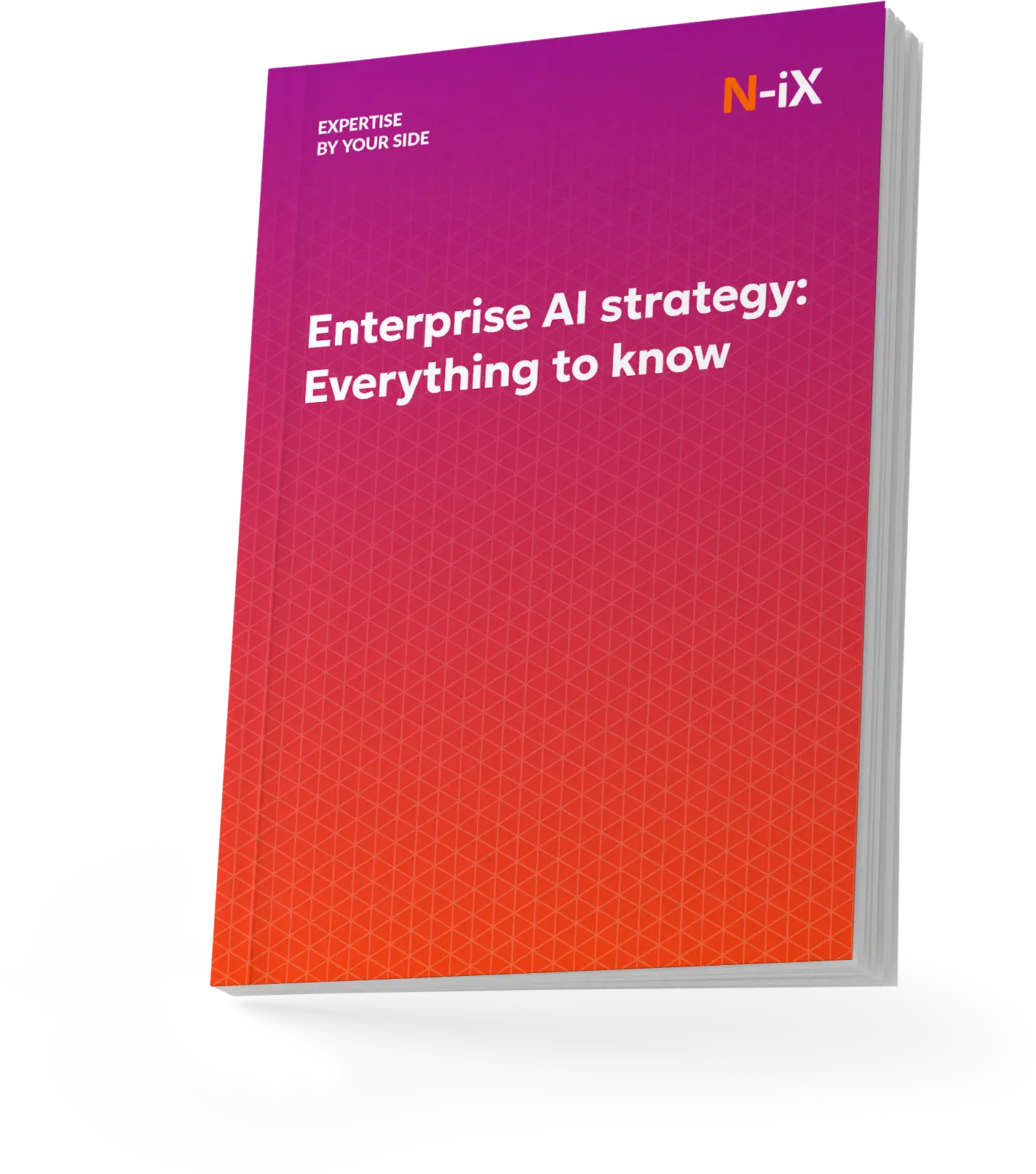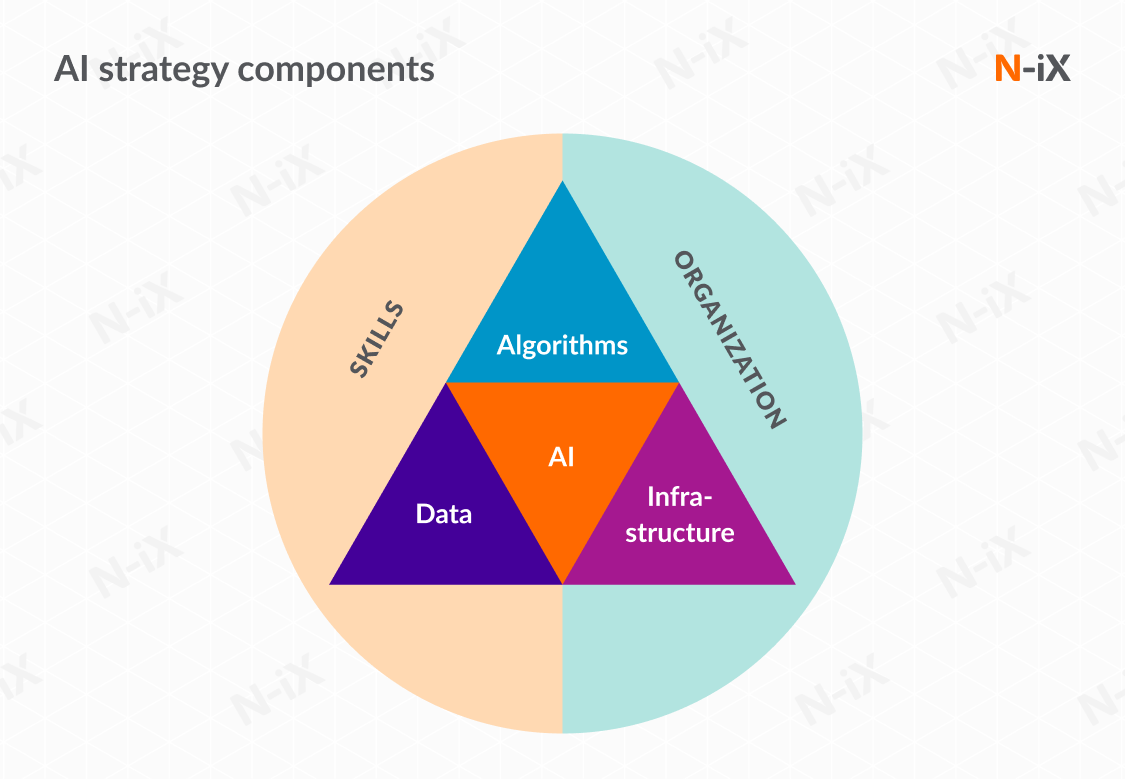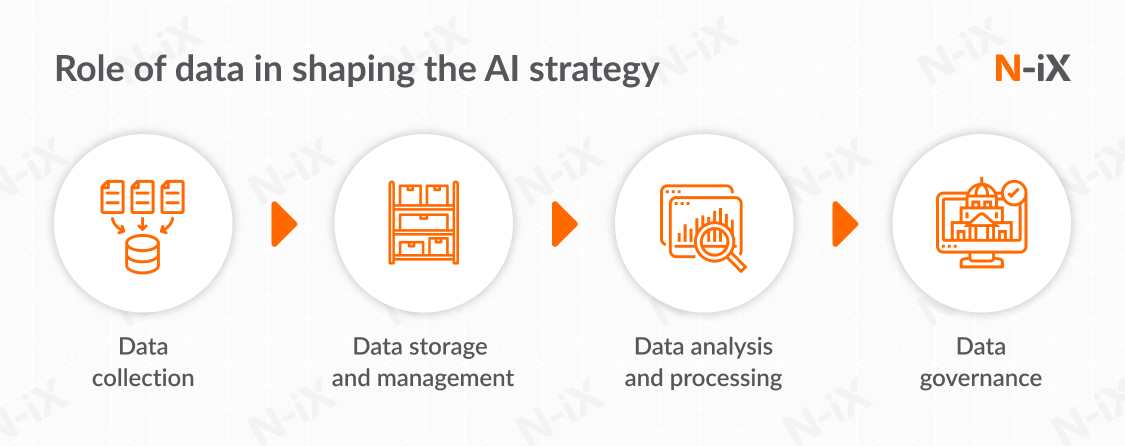Artificial Intelligence is reshaping industries and redefining how organizations compete, innovate, and scale. Yet turning AI from a promising concept into measurable business value requires more than deploying isolated solutions. It calls for a structured strategy that connects technology capabilities with long-term business objectives. Unlike a traditional business strategy, an AI strategy must account for the unique challenges of data availability, technical infrastructure, workforce readiness, and ethical considerations.
Recent studies illustrate both the urgency and the opportunity. PwC estimates that AI could add $15.7 trillion to the global economy by 2030, while IBM's Global AI Adoption Index shows that one in four companies already use AI to mitigate talent shortages. These numbers highlight that enterprises are moving quickly, and falling behind means missing significant achievements in efficiency, innovation, and competitiveness.
The challenge is that adopting AI at scale is not straightforward. Organizations must decide where AI and ML solutions can deliver the most significant impact, how to integrate them into existing processes, and what governance and resources are required to ensure sustainability. This is where AI strategy consulting steps in. By combining technical expertise in AI consulting services with business alignment, we bridge the gap between ambition and execution. This blog explores the connection between data strategy and the broader AI framework. How can consulting help overcome the hurdles of creating AI-driven business solutions?
What is AI strategy consulting?
An AI strategy is a plan for how a business will use AI technologies. It helps the company reach its goals and gain a competitive advantage. It requires a clear understanding of AI's possible uses. It also includes the technical, operational, and ethical issues involved. For example, with the rise of generative AI, organizations must now consider how content-creating models fit into their broader strategy.
An ideal AI strategy should answer the following key questions:
- What are our goals for AI? These can be varied, such as improving operational efficiency, boosting customer satisfaction, or driving innovation in products and services.
- Where and how can we apply AI? The task is to identify the areas within the business that could benefit from AI and understand how different solutions, such as Machine Learning models, Natural Language Processing, and Robotic Process Automation, can be implemented.
- What resources do we need to implement AI? It considers the infrastructure, technical skills, and data required to develop, deploy, and maintain AI solutions.
- How can we manage the risks and ethical implications of AI? This question addresses the potential challenges related to data privacy, bias in AI algorithms, job displacement, and other ethical concerns.
Reap the benefits of AI for enterprises with a tailored strategy—access our expert insights today!


Success!

Once an organization has a clear intent to establish an AI strategy, consulting comes into play. AI strategy consultants provide a blend of technical expertise and strategic insight, helping businesses to:
- understand their current state of AI readiness;
- define a vision for AI adoption;
- conduct PoC;
- build a roadmap and propose reasonable timelines;
- propose team composition and associated costs;
- conduct the AI/ML solutions architecture review;
- manage the related risks;
- ultimately implement AI solutions that align with their business objectives.

The role of data strategy in shaping the AI strategy
The development of an AI strategy cannot be separated from the organization's data strategy. AI-based systems depend on data to train models, extract meaningful insights, and generate reliable predictions. AI initiatives are unlikely to achieve consistent or meaningful results without a well-defined approach to managing and utilizing data. That's why it is integral to examine the data strategy's role and outline its essential components for effective AI implementation.
Data collection
In the initial phase of developing a broader AI strategy, it's essential to focus on data collection. Organizations need to identify relevant data sources, both internal and external, that can feed into their AI systems.
Internal data can include sales records, transaction details, and customer service information. External data may come from public databases and other sources. It's important to use trustworthy data sources. Make sure the data collected reflects real-world situations the AI system will face.
Data storage and management
Data storage and processing are the next step in the chain. AI technologies need a lot of data. Organizations must have the right systems to store and manage this data well. It includes the use of сloud solutions and Big Data solutions. They offer scalability and flexibility for handling large datasets. Proper storage and management practices give enterprises a competitive advantage, as they allow data to be readily available for training and applying advanced analytics and AI models.
Data analysis and processing
Then comes the stage of data analysis and processing. The collected data has to be cleaned, structured, and analyzed to extract valuable insights. Researchers employ statistical analysis and Machine Learning models to identify patterns, correlations, and trends within the data. This stage is fundamental because the quality and relevance of insights here affect how AI systems make decisions.
Data governance
Lastly, any effective data strategy must address data governance. It covers the policies, procedures, and standards to ensure ethical and lawful data use. Data governance includes privacy policies that protect sensitive information. It also has guidelines to follow data protection rules like GDPR. In today's world, data breaches are more common. Strong data governance is now a legal requirement. It is also key to building trust with customers and stakeholders.
Given the complexity and importance of these elements, partnering with a reputable AI strategy consulting provider becomes a top priority. At N-iX, we deeply understand data management best practices and the specific challenges associated with AI technologies. In aggregate, this knowledge guides our clients in creating a data strategy. The one that is robust, effective, and aligned with their broader business objectives.
Let's discover one example. Here, designing a data strategy has helped our client to leverage their data more efficiently and drive the potential for AI-powered initiatives.

The success story of designing a data strategy
As a comprehensive ecommerce provider, cleverbridge strives to meet every customer's needs. One of their biggest clients needed an analytics solution to deliver insights with stronger and more accessible visualizations.
Cleverbridge faced the challenge of improving its tool for subscription reports. This tool shows revenue and new customer numbers. They wanted to add more visual data to make it more informative.
Our approach
We partnered with cleverbridge to design a data strategy with a clear implementation plan of a reporting solution using Power BI. This approach involved an extensive Product Discovery Phase. During this stage, N-iX's team interviewed client stakeholders and thoroughly examined existing processes. Our team leveraged the insights from this discovery phase to build a modern data platform based on AWS and establish effective data governance.
A robust data strategy is paramount for any business to effectively leverage data analytics and AI solutions. A well-crafted data strategy can enhance business decision-making, improve customer insights, and optimize operations.
N-iX significantly contributed to designing a comprehensive data strategy for cleverbridge. It involved understanding the existing processes, gathering requirements, and devising an implementation plan. This strategic roadmap became the backbone of the enhanced reporting solution that cleverbridge sought to offer its customers.
Value delivered by N-iX
N-iX created a data analytics solution for cleverbridge. This solution helped them meet their needs and expand their services by adding the solution to their product line. The designed solution also led to several additional benefits, including:
- Enhanced their value proposition by offering a universal reporting solution, which attracted more customers;
- Improved information security through the effective data governance of the developed data platform;
- Boosted business decision-making capabilities by using the solution internally to gain insights into client performance.
AI strategy consulting roadmap
AI strategy consulting services guide organizations through adopting and integrating Artificial Intelligence into their operations. These AI strategy services address a wide range of business and technical requirements. Each addresses unique requirements and obstacles companies face when crafting their AI strategy. Our experts outline the following phases that contribute to a coherent and practical AI roadmap.
1. AI readiness assessment
The readiness assessment is the initial step in most AI initiatives. In this phase, AI strategy consulting specialists at N-iX thoroughly evaluate the organization's readiness to introduce and manage AI technologies. We analyze the current IT infrastructure, assess data availability and quality, and review the level of expertise across teams. In addition, we examine how potential AI projects align with the company's overall business objectives, ensuring that future initiatives are both technically viable and strategically relevant.
2. AI strategy development
Once the readiness assessment is complete, our team collaborates closely with stakeholders to design an AI strategy tailored to business priorities. Together, we define the goals that AI-driven solutions can help achieve and specify the technologies and applications most suitable for the organization's context. The strategy also addresses the resources and infrastructure needed for deployment. At this point, N-iX provides a detailed implementation plan and establishes a framework for measuring success, ensuring that AI initiatives deliver outcomes consistent with business objectives.
3. Planning and support for AI implementation
After AI consulting & strategy development steps, our team helps organizations move from strategy to execution. This involves selecting the appropriate tech stack, designing and developing AI solutions, and integrating them into existing systems and processes. Once solutions are developed, we conduct thorough testing to evaluate their effectiveness and reliability.
Our AI strategy consultant guides and supports throughout the entire process, ensuring that the technical implementation remains aligned with the visionary objectives defined earlier. When needed, we also provide project management assistance to oversee delivery, helping to maintain timelines, control costs, and keep the implementation on track.
4. Training and change management
Adopting AI often requires adjustments to established operational processes and a focus on developing new skills within the workforce. Our AI strategy consultant team supports this transition by designing change management strategies that address the AI integration's technical and organizational aspects.
Providing AI strategy services, we organise structured training programs to help employees understand AI technologies and apply them effectively in their daily work. At the same time, we collaborate with leadership teams to promote a culture that prioritizes data-driven decision-making and continuous improvement. Building this cultural foundation is critical to ensuring the lasting impact of AI initiatives.
5. Ongoing support
AI initiatives do not end with deployment; they require ongoing oversight and refinement. We continue to support organizations beyond the initial implementation phase. Our team helps analyze the performance of AI solutions, address technical complications, and ensure that outcomes remain consistent with business goals. We also assist in optimizing the strategy and implementation over time, incorporating performance suggestions and adapting to organizational priorities. This continuous support within AI strategy consulting services helps businesses sustain the value of their AI investments and align them with future growth.

By offering these extensive services, our AI consulting services provide valuable support to businesses at every stage of their AI journey. With our unique blend of business acumen and technical expertise, AI strategy consulting helps companies navigate the complexities of implementation, maximize the value, and use AI and ML as competitive differentiators.
Keep reading: Machine Learning consulting: From a concept to measurable business value
Principles to follow in building the AI strategy
Creating a successful AI strategy involves more than just understanding the technicalities of AI. It requires a deep appreciation of business goals, ethical considerations, and a forward-thinking approach. The following principles should guide the design of any AI transformation strategy:
Alignment with business objectives
A strategy should not exist in isolation but should align with the broader business objectives. According to Deloitte's State of AI in the Enterprise report, a mismatch between the business goals and AI strategy can diminish the ability to use AI to accelerate product release or secure supply chains. In other words, the best AI strategies "begin without mentioning the AI."
Thus, a solid strategy can only deliver value, improve efficiency, enhance customer service, or develop new products or services by understanding the organization's strategic goals. Thus, each AI initiative should be linked to a specific business outcome and focus on delivering measurable results that strengthen the organization's competitive advantage.
Data governance and security
Effective data governance and security practices are essential. It involves maintaining the quality and accuracy of data and ensuring its protection against breaches and misuse. Compliance with data regulations should be a top priority, along with continuous monitoring and improvement of data management practices. A strong governance framework also helps bridge the gap between technical execution and regulatory expectations, reducing risks in AI adoption.
Scalability and adaptability
The strategy should be designed to be scalable and adaptable. It should consider the rapid pace of advancements in AI technology, including the emergence of generative AI or AI agents. Businesses should plan how their initiatives can be scaled up as their capabilities and needs grow. Companies should also know how to adapt to new developments in AI technology or changes in the business environment, ensuring their strategies continue to capture the full potential of AI.
Ethical considerations
AI's growing influence underscores the importance of ethical considerations in designing an AI strategy. It includes designing AI systems that minimize bias, provide transparency in their decision-making processes, and ensure accountability. Ethical practices also extend to monitoring Machine Learning models to prevent unintended consequences and mitigate risks. You should also consider the potential societal impact of their AI initiatives and take steps to minimize any negative consequences.
Collaboration and partnership
Designing a strategy involves venturing into new and complex territory. Experienced AI strategy consultant like N-iX can provide valuable resources, technical expertise, and fresh perspectives. Collaborative efforts can be particularly beneficial in navigating the complexities and uncertainties associated with building a custom AI strategy.
You can start working on the strategy design once you follow these principles in close cooperation with our Data team. In particular, the strategy will meet their unique needs and goals and address AI's wider ethical and societal implications. A well-designed strategy can serve as a roadmap, guiding businesses and helping them leverage the full potential of AI responsibly and effectively.
AI strategy consulting: closing thoughts
AI strategy consulting is a compass in the digital world. It guides businesses through the complexities of AI adoption and helps them navigate their AI journey. From assessing readiness and developing a comprehensive strategy to offering support during implementation and ensuring continuous optimization, AI consultants at N-iX enable enterprises with successful transformation.
In the age of AI, businesses must be willing to adapt, innovate, and embrace change. With professional AI consulting & strategy development support, you can successfully embark on your AI journey, maximize the value derived from AI, and stay competitive in the digital era. The future of AI is here, and it's up to us to seize the opportunities it presents.
Why choose N-iX as your provider of AI strategy services?
- N-iX stands as a prominent Data and Analytics services provider, demonstrating over a decade of proficiency in data-related services.
- The company boasts a sizable team of over 200 data experts. All are skilled in multiple areas such as Big Data, AI/ML, legacy migration, Data Science, and Data Analytics.
- The services offered by N-iX extend to AI consulting, development and the implementation of intelligent solutions powered by AI and ML, covering a broad spectrum of applications.
- Deep learning, predictive analytics, customer behavior analysis, risk allocation and mitigation, and predictive maintenance are among the AI and ML applications that N-iX offers.
- N-iX's AI and ML services have attracted a range of clients. For example, Bosch, eBay, Redflex, Lebara, AVL, Ringier, cleverbridge, and Fortune 500 companies.
- N-iX strictly adheres to industry regulations and standards such as PCI DSS, ISO 9001, ISO 27001, and GDPR.
Have a question?
Speak to an expert




